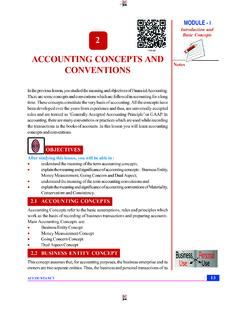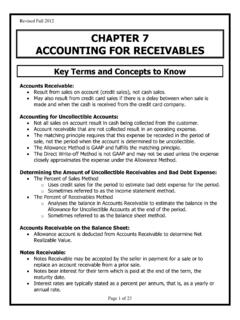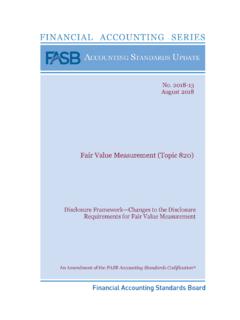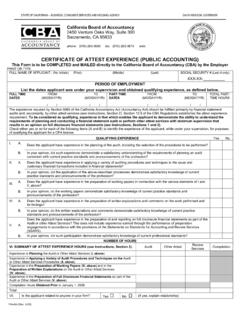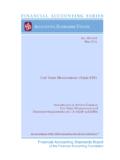Transcription of ACCOUNTING CONCEPTS - Sinhgad
1 MODULE - 1 Basic AccountingNotes 17 ACCOUNTING ConceptsACCOUNTANCYIn the previous lesson, you have studied the meaning and nature of businesstransactions and objectives of financial ACCOUNTING . In order to maintainuniformity and consistency in preparing and maintaining books of accounts,certain rules or principles have been evolved. These rules/principles areclassified as CONCEPTS and conventions. These are foundations of preparingand maintaining ACCOUNTING records. In this lesson we shall learn aboutvarious ACCOUNTING CONCEPTS , their meaning and studying this lesson, you will be able to :lexplain the term ACCOUNTING concept;lexplain the meaning and significance of various ACCOUNTING CONCEPTS : Business Entity, Money Measurement, Going Concern, AccountingPeriod, Cost Concept, Duality Aspect concept, Realisation Concept,Accrual Concept and Matching MEANING AND BUSINESS ENTITY CONCEPTLet us take an example.
2 In India there is a basic rule to be followed byeveryone that one should walk or drive on his/her left hand side of the helps in the smooth flow of traffic. Similarly, there are certain rules thatan accountant should follow while recording business transactions andpreparing accounts. These may be termed as ACCOUNTING concept. Thus, thiscan be said that : ACCOUNTING concept refers to the basic assumptions and rules andprinciples which work as the basis of recording of business transactionsand preparing CONCEPTSACCOUNTANCYMODULE - 1 NotesAccounting ConceptsBasic ACCOUNTING 18 The main objective is to maintain uniformity and consistency in accountingrecords. These CONCEPTS constitute the very basis of ACCOUNTING . All theconcepts have been developed over the years from experience and thus theyare universally accepted rules. Following are the various accountingconcepts that have been discussed in the following sections :lBusiness entity conceptlMoney measurement conceptlGoing concern conceptlAccounting period conceptlAccounting cost conceptlDuality aspect conceptlRealisation conceptlAccrual conceptlMatching conceptBusiness entity conceptThis concept assumes that, for ACCOUNTING purposes, the business enterpriseand its owners are two separate independent entities.
3 Thus, the business andpersonal transactions of its owner are separate. For example, when theowner invests money in the business, it is recorded as liability of thebusiness to the owner. Similarly, when the owner takes away from thebusiness cash/goods for his/her personal use, it is not treated as businessexpense. Thus, the ACCOUNTING records are made in the books of accountsfrom the point of view of the business unit and not the person owning thebusiness. This concept is the very basis of us take an example. Suppose Mr. Sahoo started business investingRs100000. He purchased goods for Rs40000, Furniture for Rs20000 andplant and machinery of Rs30000. Rs10000 remains in hand. These are theassets of the business and not of the owner. According to the business entityconcept Rs100000 will be treated by business as capital a liability ofbusiness towards the owner of the suppose, he takes away Rs5000 cash or goods worth Rs5000 for hisdomestic purposes.
4 This withdrawal of cash/goods by the owner from theMODULE - 1 Basic AccountingNotes 19 ACCOUNTING ConceptsACCOUNTANCY business is his private expense and not an expense of the business. It istermed as Drawings. Thus, the business entity concept states that businessand the owner are two separate/distinct persons. Accordingly, any expensesincurred by owner for himself or his family from business will be consideredas expenses and it will be shown as following points highlight the significance of business entity concept :lThis concept helps in ascertaining the profit of the business as only thebusiness expenses and revenues are recorded and all the private andpersonal expenses are concept restraints accountants from recording of owner s private/personal also facilitates the recording and reporting of business transactionsfrom the business point of viewlIt is the very basis of ACCOUNTING CONCEPTS , conventions and QUESTIONS in the blanks with suitable word/words(i)The ACCOUNTING CONCEPTS are basic.
5 Of ACCOUNTING .(ii)The main objective of ACCOUNTING CONCEPTS is to maintain ..and .. in the ACCOUNTING record.(iii).. concept assumes that business enterprise and its ownersare two separate independent entities.(iv)The goods drawn from business for owner s personal use are MONEY MEASUREMENT CONCEPTThis concept assumes that all business transactions must be in terms ofmoney, that is in the currency of a country. In our country such transactionsare in terms of , as per the money measurement concept, transactions which can beexpressed in terms of money are recorded in the books of accounts. Forexample, sale of goods worth , purchase of raw materialsACCOUNTANCYMODULE - 1 NotesAccounting ConceptsBasic ACCOUNTING , Rent Paid etc. are expressed in terms of money, andso they are recorded in the books of accounts.
6 But the transactions whichcannot be expressed in monetary terms are not recorded in the books ofaccounts. For example, sincerity, loyality, honesty of employees are notrecorded in books of accounts because these cannot be measured in termsof money although they do affect the profits and losses of the aspect of this concept is that the records of the transactions areto be kept not in the physical units but in the monetary unit. For example,at the end of the year 2006, an organisation may have a factory on a pieceof land measuring 10 acres, office building containing 50 rooms, 50personal computers, 50 office chairs and tables, 100 kg of raw materialsetc. These are expressed in different units. But for ACCOUNTING purposes theyare to be recorded in money terms in rupees. In this case, the cost offactory land may be say crore, office building of crore,computers lakhs, office chairs and tables lakhs, raw lakhs.
7 Thus, the total assets of the organisation are valued at and lakhs. Therefore, the transactions which can be expressedin terms of money is recorded in the accounts books, that too in terms ofmoney and not in terms of the following points highlight the significance of money measurementconcept :lThis concept guides accountants what to record and what not to helps in recording business transactions all the business transactions are expressed in monetary terms, it willbe easy to understand the accounts prepared by the business facilitates comparison of business performance of two differentperiods of the same firm or of the two different firms for the QUESTIONS a tick mark ( ) against the information that should be recorded in thebooks of accounts and cross mark ( ) against the information that shouldnot be recorded(i)Health of a managing director(ii)Purchase of factory building croreMODULE - 1 Basic AccountingNotes 21 ACCOUNTING ConceptsACCOUNTANCY(iii)Rent paid (iv)Goods worth given as charity(v)
8 Delay in supply of raw GOING CONCERN CONCEPTThis concept states that a business firm will continue to carry on its activitiesfor an indefinite period of time. Simply stated, it means that every businessentity has continuity of life. Thus, it will not be dissolved in the near is an important assumption of ACCOUNTING , as it provides a basis forshowing the value of assets in the balance sheet; For example, a companypurchases a plant and machinery of and its life span is 10 to this concept every year some amount will be shown asexpenses and the balance amount as an asset. Thus, if an amount is spenton an item which will be used in business for many years, it will not beproper to charge the amount from the revenues of the year in which theitem is acquired. Only a part of the value is shown as expense in the yearof purchase and the remaining balance is shown as an following points highlight the significance of going concern concept;lThis concept facilitates preparation of financial the basis of this concept, depreciation is charged on the fixed is of great help to the investors, because, it assures them that theywill continue to get income on their the absence of this concept, the cost of a fixed asset will be treatedas an expense in the year of its business is judged for its capacity to earn profits in QUESTIONS in the blanks by selecting correct words given in the bracket/brackets:(i)Going concern concept states that every business firm will continueto carry on its activities.
9 (for a definite time period, foran indefinite time period)ACCOUNTANCYMODULE - 1 NotesAccounting ConceptsBasic ACCOUNTING 22(ii)Fixed assets are shown in the books at their .. (cost price,market price)(iii)The concept that a business enterprise will not be closed down in thenear future is known as .. (going concern concept, moneymeasurement concept)(iv)On the basis of going concern concept, a business prepares (financial statements, bank statement, cash statement)(v).. concept states that business will not be dissolved innear future. (Going concern, Business entity) ACCOUNTING PERIOD CONCEPTAll the transactions are recorded in the books of accounts on the assumptionthat profits on these transactions are to be ascertained for a specified is known as ACCOUNTING period concept. Thus, this concept requiresthat a balance sheet and profit and loss account should be prepared at regularintervals.
10 This is necessary for different purposes like, calculation of profit,ascertaining financical position, tax computation , this concept assumes that, indefinite life of business is divided intoparts. These parts are known as ACCOUNTING Period. It may be of one year,six months, three months, one month, etc. But usually one year is taken asone ACCOUNTING period which may be a calender year or a financial that begins from 1st of January and ends on 31st of December,is known as Calendar Year. The year that begins from 1st of April andends on 31st of March of the following year, is known as per ACCOUNTING period concept, all the transactions are recorded in thebooks of accounts for a specified period of time. Hence, goods purchasedand sold during the period, rent, salaries etc. paid for the period areaccounted for and against that period helps in predicting the future prospects of the helps in calculating tax on business income calculated for a particulartime also helps banks, financial institutions, creditors, etc to assess andanalyse the performance of business for a particular also helps the business firms to distribute their income at regularintervals as - 1 Basic AccountingNotes 23 ACCOUNTING ConceptsACCOUNTANCYINTEXT QUESTIONS in the blanks with suitable word/words.
